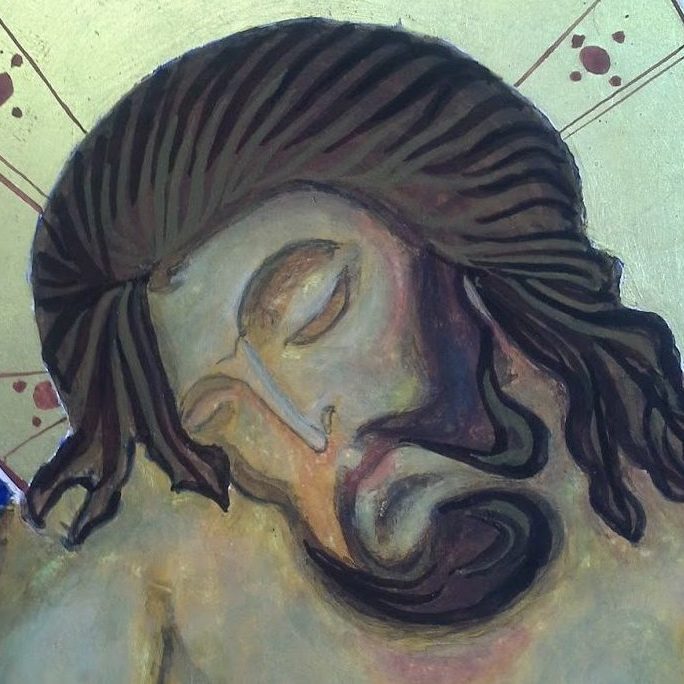I really love David Suchet as Hercule Poirot – Kenneth Brannagh doesn’t come anywhere near, in my humble opinion! I watched a programme David Suchet did once – it was called ‘In The Footsteps of St Peter’, in which he described getting the ‘walk’ of his characters right – once he’d mastered their walk he got their character nailed. You can certainly see this with his Poirot – there in the walk is all the pernicketiness, all the preciousness, all the campness, all the exactness and cleverness. He’s a brilliant actor! I can’t exactly remember how he approached Peter’s walk, but I’m sure it wasn’t dainty and prissy like Hercule’s. I imagine Peter had very big feet and was always treading in stuff because he’d walk with confidence and not much forethought. St Peter probably always had a faint aroma of dog poo – he probably trampled in it everywhere he went. Maybe sheep poo – that feels a bit kinder.
In today’s gospel, he’s busy trampling all over everything, trying to tell Jesus what must and mustn’t happen in his usual exuberant and rather unthinking manner. Jesus gets so annoyed with him, he actually calls him Satan! This spat happened because Peter approached a great mystery with his mouth open and his ears and soul closed. Jesus must have looked sorrowful when he was talking to his disciples about his forthcoming suffering. Perhaps this is what Peter was responding to – his way of saying ‘I’m sure it will be fine. Everything will be OK.’ In fact this is what we all tend to do when confronted with someone’s bad news – we tell stories of someone else we knew who had this and got better, or about improved statistics for recovery – instead of listening to the person with the bad news and trying truly to hear what is being said. For people who are seriously ill, this is one of the things that makes them isolated and lonely – the unremitting optimism of others. They don’t need prophets of doom either – just the odd person who will listen and ask how they’re feeling, what their take on the situation is.
Just a few verses before today’s passage, Peter has acknowledged Jesus’ divinity; ‘You are the Messiah, the Son of the living God.’ So his approach to Jesus’ words about his suffering betrays his approach to the divine: he was telling God what to do. Instead of listening, being in awe, he was chattering away, letting his ego speak – I think he was enjoying being part of Jesus’ inner circle and didn’t want to contemplate loss of status or power. He was completely un-self-reflective!
When I look at the state of the church today, I see a lot of Peters: I see and hear many who take a particular stance because it confirms their own status and position. No thought about what this might do to others. By using certain kinds of language, your place on the bandwagon is assured. By denouncing others, your own ego is flattered. The collective result of this is that the Church of England has become misogynistic, homophobic and beset by business-speak which betrays an underlying secularism – possibly even atheism.
As an antidote to all this, I offer you Moses. When confronted with the divine he took off his shoes. Then he hid his face – he was so overawed by what he had seen and heard. When he was asked to go as God’s messenger to Pharoah, he said ‘who am I to do that?’ ‘Who? Me? Surely not?’ Here is no out of control ego, but someone who feels unable to speak in the face of the divine, someone who, in God’s presence, feels inadequate, unsure and way, way out of his depth. I think he was the first person to be recorded as suffering from imposter syndrome! If David Suchet were to do a Moses walk, he would be walking, very carefully, on his tiptoes!
To take off one’s sandals because one treads on holy ground – this is a good way to live. This story, I think, is behind the Muslim practice of removing shoes before entering the Mosque – it is in the Koran too. Here we have something to learn from our Muslim brothers and sisters – that sense of treading on hallowed ground, and awareness of the need to tread lightly and gently. I think of this as much as an attitude of mind as a physical action. Imagine, for instance, how differently the conversation in today’s Gospel would have been, had Peter remembered something he had known only a few moments before – that he was in the presence of God’s Son, that he was on hallowed ground – and behaved accordingly.
And ourselves? And the Church of England of which we are all a part? What if we followed Moses’ example, instead of Peter’s. What if we learned to take off our shoes, acknowledge holy ground, say ‘Who? Me? Surely not?’ And what if we discovered that everywhere is holy ground, and that God’s face shines out of many faces, and that if we listened instead of saying what simply flatters our own egos and makes us feel superior, we would find ourselves in God’s presence and be driven even further into stillness and silence?
I have been very unkind to Peter, for I’m not sure I would have the courage to be crucified as he was, to give up what he gave up and keep going as long as he did. Here he got it massively wrong – a few minutes before he had got it exactly right. He is one of the founding Fathers of the Church – we wouldn’t be here were it not for Peter. But sometimes he really needed to learn to take off his shoes and walk on tiptoe.
Tweet
